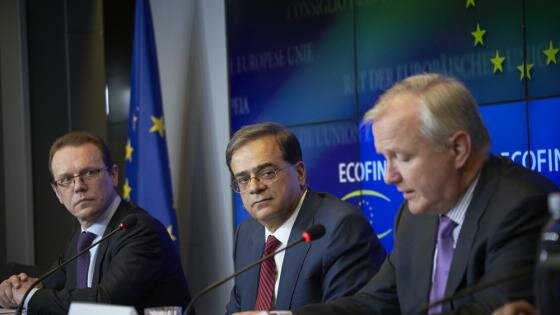- ECOFINEconomic & Financial Affairs (ECOFIN)
Last ECOFIN under Greek Presidency: Mission accomplished
At today’s ECOFIN meeting, the last one under the Greek Presidency, a political agreement was reached on the Commission’s proposal to amend the Parent Subsidiaries Directive (2011/96/EU) on the common system of taxation applicable in the case of parent companies and subsidiaries of Member States.
ECOFIN President, Gikas Hardouvelis, welcomed the agreement: “Today’s agreement counters double non-taxation of corporate groups deriving from hybrid loan arrangements. This agreement allows for closing the ‘hybrid loan mismatch’ loopholes generating important losses of revenues in our countries. Thus, we are making a tangible step forward in the fight against tax fraud and tax avoidance, also in response to a request by the European Council in December 2013”.
After the working breakfast, where Finance Ministers were debriefed on the Eurogroup and the economic situation, the Commission presented to the Council the EU’s draft general budget for 2015.
The Greek Presidency provided information on current legislative proposals. Moreover, the Commission briefed the Council on the state of play of the implementing legislation concerning bank contributions to resolution funds, under the recently agreed bank resolution rules (the Bank Recovery and Resolution Directive, and the Regulation on the Single Resolution Mechanism).
As part of the European Semester 2014 process, ECOFIN Ministers discussed Country-Specific Recommendations on Member States’ economic and fiscal policies. The Council approved recommendations to 26 Member States and a specific Recommendation on the broad guide lines for the economic policies of the Member States whose currency is the euro.
Furthermore, the Council, on the basis of the Commission’s proposal, adopted a Recommendation that will enable Lithuania to become the 19th member of the euro area as of 1 January 2015.
Both the Country-Specific Recommendations and the Recommendation on Lithuania adopting the euro will be referred to the European Council on 26-27 June before decisions are taken.
In the framework of the implementation of the Stability and Growth Pact, the Council adopted decisions on the abrogation of Excessive Deficit Procedures (EDP) for Belgium, the Czech Republic, Denmark, the Netherlands, Austria and Slovakia. It also endorsed Terms of Reference on the review of the methodology for the assessment of Member States’ effective action in the context of the EDP.
Additionally, the Council approved conclusions on the implementation of a Code of Conduct for business taxation aimed at eliminating situations of harmful tax competition.
Concluding the ECOFIN meeting, the President, Gikas Hardouvelis, made a brief reference to the work accomplished during the Greek Presidency:
“It has been a demanding exercise for Greece considering the tight timeframe in the run up to the European elections in May. Nevertheless, we have managed to reach an agreement on a number of important files, as well as to make considerable progress on many others.
The Presidency has put strong emphasis on the revision of the regulatory framework for the operation and the supervision of the financial sector, in order to strengthen confidence and increase liquidity in the European economy.
During the first quarter of the presidency, we made Banking Union a key priority and we managed to reach an agreement acceptable by all parties on the most difficult file of the banking union, which is the Single Resolution Mechanism (SRM).
The Regulation, together with the Single Resolution Fund, substantially completes the building up of the Banking Union, which constitutes one of the most challenging goals towards economic and financial integration, since the adoption of the common currency.
During the second quarter of the Presidency, we put emphasis on the progress of pending tax legislation as it is highly important to take appropriate action at European level, against taxation practices that undermine citizens’ and investors’ confidence and encourage tax fraud and tax evasion.
The effective management of the fourth European Semester cycle has also been a priority throughout this period.
During the second quarter of the Presidency, we put emphasis on the progress of pending tax legislation as it is highly important to take appropriate action at European level, against taxation practices that undermine citizens’ and investors’ confidence and encourage tax fraud and tax evasion.
The effective management of the fourth European Semester cycle has also been a priority throughout this period.”
Read more here.










